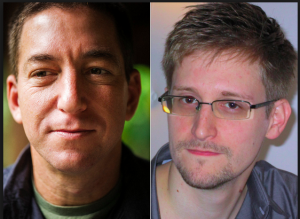 aNewDomain — Edward Snowden has been vindicated. But has he won?
aNewDomain — Edward Snowden has been vindicated. But has he won?
Vindication came in the form of a court decision and congressional action. Two weeks ago, a federal appeals panel in New York became the first court to consider the legality of one of the National Security Agency programs leaked by Snowden, the once-secret NSA phone spying program it uses to bulk surveillance of the American people.
Though the government is certain to appeal, the court’s decision was a clear rebuke to the NSA and the Obama Administration. Even under the notorious Section 215 of the USA Patriot Act, the gathering of “telephony metadata” — times, places and numbers of both ends of phone calls — is illegal, the judges ruled.
The decision breathed new life into the USA Freedom Act, a bill designed to curtail the NSA’s telephony metadata program, called “Stellar Wind.”
Thanks to a coalition of libertarian-minded Republicans like Rand Paul and traditional liberal Democrats, a reform believed doomed seems likelier to bring about the first legislative rollback of government intrusiveness since 9/11.
 This is good news for privacy, and thus for our basic rights as citizens. But I’m struck at how limited the debate over the Snowden leaks has been since he stepped out of the shadows nearly two years ago.
This is good news for privacy, and thus for our basic rights as citizens. But I’m struck at how limited the debate over the Snowden leaks has been since he stepped out of the shadows nearly two years ago.
The NSA’s telephony metadata program was the first story revealed by Snowden and Guardian columnist Glenn Greenwald (both are pictured at left) from their Hong Kong hotel room in June 2013. So far, it’s the only NSA leak to have received extensive coverage from U.S. state-controlled media — and the only program to have been addressed by the legislative and judicial branches of the political system.
But that’s just the tip of the iceberg when it comes to NSA spying on Americans. Snowden took tens of thousands of top-secret documents, which reveal numerous active domestic surveillance sweeps that are, if anything, even more intrusive and worrisome than telephony metadata.
I’ve become familiar with these other NSA programs while researching my biography of Snowden, which will be published in September 2015. Look beyond NSA phone spying and you’ll find plenty to be deeply disturbed about.
Other NSA Spying Programs? Mystic, Blarney, Lithium …
There is, for example, NSA’S “Mystic” program, in which the NSA records not just the data about, but the actual audio, of your calls, and stores them for years so they can listened to at any time. According to the Snowden documents, Mystic records 100% of phone calls in some countries, and perhaps as many as 80% of calls here in the United States. And remember, these documents are several years old. Coverage is probably more extensive today. If Americans knew the content of their calls was being intercepted, stored and listened to, they’d freak out more than over the metadata — but the media has ignored Mystic.
NSA programs with derpy names like “Blarney,” “Lithium” and “Stormbrew” store 75% of all Internet traffic in the United States: emails, text messages, voice over Internet calls, Skype, online banking. They’ve received almost zero coverage.
An NSA program called “Gumfish” allows the agency to activate the camera on your laptop or desktop computer to see what you’re doing in your home. According to Snowden, NSA analysts used “Gumfish” to collect and distribute photos of Americans nude in their homes, sometimes having sex.
They’ve even created George Orwell’s fictional “telescreen” from 1984. “Capitivated Audience” lets them listen to you through your cellphone — even when it’s powered “off” — and the new generation of “smart TV” are a little too smart for our own good, since the NSA can use them to watch us in our homes.
Why Are We Ignoring The Other Evidence On NSA Spying
“The only debate we’re really having in the U.S. is about the very first document that Snowden produced,” former NSA general counsel Stewart Baker told The New York Times. “The rest of the documents have been used as a kind of intelligence porn for the rest of the world — ‘Oooh, look at what NSA is doing.'”
Baker is an ardent NSA defender who vehemently disagrees that Snowden was right to leak the documentation behind these programs. But his remarks inadvertently prompt one to ask, why haven’t we been talking about these other, arguably worse, violations of privacy?
Is it the media’s notorious inability to sustain focus on stories, especially when they’re complicated? Or are they consciously complicit in a conspiracy to keep silent about America’s out-of-control security state — nothing to see here, just move on?
The Failure of Intercept
Glenn Greenwald, his partner the documentary filmmaker Laura Poitras and other principals behind First Look Media created The Intercept to handle releases of the Snowden files, hoping that the “drip drip drip” effect of one revelation after another after another would become impossible for the Obama Administration and its allies to withstand.
It was a smart strategy, one that I thought would work when they came up with it. Two years in, however, with new revelations coming out every few weeks, each so startling that it might have once brought down a government by itself, it hasn’t turned out that way. Like a dog reduced to whimpering helplessness by sustained abuse, Americans go about their daily lives convinced they can’t do a thing about these outrageous NSA abuses.
What has been lacking heretofore, however, has been a comprehensive overview of the Snowden revelations: what exactly the NSA is up to and why it matters. My book “Snowden,” which sets forth these programs and the politics behind them in an easy-to-follow graphic novel format, should partly remedy that. Later, Oliver Stone’s movie about Snowden — slated for a December release — may put Snowden back at the top of our flaky media’s awareness.
In the meantime, it’s important to remember that telephony metadata is only a tiny part of the NSA’s war on American privacy. Even total victory — elimination of bulk collection, which is unlikely — would leave many more battles to fight for those who care about freedom.
Exclusively for aNewDomain, I’m Ted Rall,
Inside image: Edward Snowden and journalist Glenn Greenwald, Rolling Stone, All Rights Reserved.
Cover image: Edward Snowden, Wikimedia Commons.













